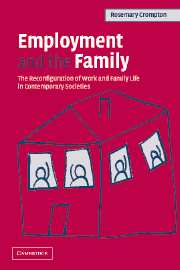Book contents
- Frontmatter
- Contents
- Preface
- 1 Understanding change in employment, family and gender relations
- 2 Caring and working
- 3 Women, men, organisations and careers
- 4 Work–life articulation, working hours and work–life policies
- 5 States, families and work–life articulation
- 6 Households, domestic work, market work and happiness
- 7 Class, family choices and women's employment
- 8 Conclusions
- Appendix A Additional ISSP Family 2002 questions
- Appendix B Joseph Rowntree Foundation (JRF) interviewees cited
- Bibliography
- Index
- References
Bibliography
Published online by Cambridge University Press: 22 September 2009
- Frontmatter
- Contents
- Preface
- 1 Understanding change in employment, family and gender relations
- 2 Caring and working
- 3 Women, men, organisations and careers
- 4 Work–life articulation, working hours and work–life policies
- 5 States, families and work–life articulation
- 6 Households, domestic work, market work and happiness
- 7 Class, family choices and women's employment
- 8 Conclusions
- Appendix A Additional ISSP Family 2002 questions
- Appendix B Joseph Rowntree Foundation (JRF) interviewees cited
- Bibliography
- Index
- References
- Type
- Chapter
- Information
- Employment and the FamilyThe Reconfiguration of Work and Family Life in Contemporary Societies, pp. 226 - 240Publisher: Cambridge University PressPrint publication year: 2006



